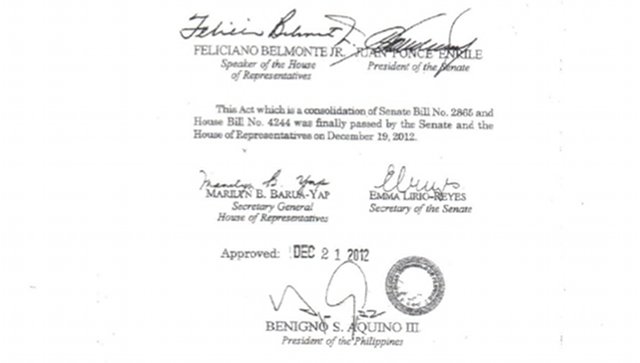SUMMARY
This is AI generated summarization, which may have errors. For context, always refer to the full article.

(UPDATED) MANILA, Philippines – As promised, the Philippines enters 2013 with a Reproductive Health law.
President Benigno Aquino III signed into law Republic Act No. 10354 or the “Responsible Parenthood and Reproductive Health Act of 2012” Friday last week, December 21, according to a copy obtained by Rappler.
It was signed without fanfare, confirmed House Majority Leader Neptali Gonzales II on Friday, December 28.
On Saturday, December 29, Malacañang issued a statement saying:
“The passage into law of the Responsible Parenthood Act closes a highly divisive chapter of our history—a chapter borne of the convictions of those who argued for, or against this Act, whether in the legislative branch or in civil society. At the same time, it opens the possibility of cooperation and reconciliation among different sectors in society: engagement and dialogue characterized not by animosity, but by our collective desire to better the welfare of the Filipino people.
(READ: The long and rough road to the RH law. The inside story.)
This is the mark of a true democracy: one in which debate that spans all levels of society is spurred by deeply-held beliefs and values, enriching and elevating public discourse, as we all work together to find ways to improve the lives of our fellow citizens.”
Landmark legislation
The RH law provides universal access to reproductive health care services and information, which do not prevent the implantation of a fertilized ovum as determined by the Food and Drug Administration. It prioritizes poorer households as identified by the National Household Targeting System for Poverty Reduction.
A new law only takes effect 15 days after it is published in the Official Gazette or in at least two newspapers.
Below is a certified true copy of the signed measure:
Social media sites were abuzz Thursday night with news that the RH bill was already signed into law because a House of Representatives staff posted on Twitter a photo of the enrolled copy of the new law. The post and the account have since been deleted.
In contrast to the intensity of debates that surrounded the divisive measure, Aquino signed the law without much fanfare. He chose to do away with formal ceremonies usually held when a landmark bill is signed.
The law, which provides access to contraceptives as a family planning method, was met with strong opposition from the Catholic Church. In the weeks leading to the RH law’s passage, bishops were among those who watched legislative proceedings from the House gallery.
The RH law was signed on the same day as RA 10353 or the Anti-Enforced or Involuntary Disappearance Act of 2012. Albay Rep Edcel Lagman is the principal author of both measures.
Lagman earlier said the enactment of the RH bill into a law will be the greatest gift of the government to Filipinos this Christmas season.
“The enactment this Yuletide season of the RH bill, which will save countless lives of women and children and assure their better future, is truly symbolic because millennia ago Jesus Christ was born in a manger to save the world,” Lagman said.
The House and the Senate approved the measure on 3rd and final reading on December 17 and ratified its final version on December 19 – the last day of session for 2012 – after Aquino gave the RH bill a final push by certifying it as urgent.
This ends the 14-year wait for a Reproductive Health law. – Rappler.com
Add a comment
How does this make you feel?
There are no comments yet. Add your comment to start the conversation.